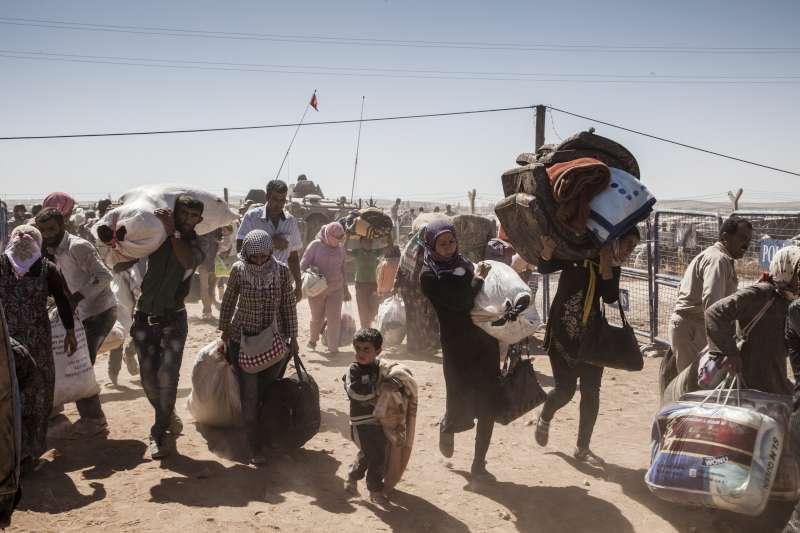Like this article? Chip in to keep stories like these coming.
![]()
Stephen Harper and the Conservatives have spent years scapegoating refugees and it is coming back to haunt them in the 2015 election campaign.
The Conservative’s messaging has been derailed by the sight of hundreds of thousands of refugees streaming into Europe, and by the images of the lifeless body of three-year-old Alan Kurdi being carried from a beach in Turkey. There is a widespread call within Canada for action.
Four million Syrian refugees
The United Nations High Commission for Refugees (UNHCR) says that there are more than four million Syrians refugees, driven out of their country by a brutal civil war. As of this summer, nearly half of Syria’s 22.5 million people have been displaced, either within their country or outside of it. While attention recently has been riveted upon desperate people trying to get into Europe, there are far greater numbers of Syrian and Iraqi refugees in neighbouring countries. There are 1.9 million Syrians in Turkey, 1.1 million in Lebanon (where they are now one of every five people), 630,000 in Jordan and 130,000 in Egypt.
Revamping policy
During the years when the Syrian conflict was building, the Conservative government was busily revamping its immigration and refugee policies. Harper put Jason Kenney, one of his most trusted ministers, in charge of making massive changes which began to arrive in 2012. The government continues to work at attracting immigrants to Canada, particularly those with skills and money, but it has attempted to discourage and denigrate asylum seekers. And it has worked. Canada took in 35,000 refugees in 2005, just before the Conservatives came to power. By 2014, the number was 23,000 — a reduction of nearly one-third.
Kenney and other Conservatives made no secret of their belief that many refugee claims were bogus and that many asylum seekers were opportunists. The government also moved in 2012 to deny refugees access to health care by making drastic cuts to the Interim Federal Health Program, which had been in place since 1957.
Stay the course
During the 2015 campaign, Harper has, so far, stubbornly insisted that he will stay the course — no added numbers of refugees beyond previous modest promises and no fundamental changes to practices or policies that would expedite the process of getting people to safety in Canada.
Speaking at a campaign event on September 3, Harper said, “Our country has the most generous immigration and refugee system in the world. We admit per capita more people than any other.” Note that the prime minister speaks here of both immigrants and refugees. While Canada continues to court a certain demographic among immigrants, it has deliberately reduced the number of refugees it accepts.
Poor record
Using UNHCR numbers, the National Post — normally considered friendly to the Conservatives — reports that when all classes of refugees are considered, Canada ranks 41st globally in terms of its intake per capita, lower than poor countries such as Turkey and Jordan. When gross domestic product and geographic size are ranked, Canada places 55th and 93rd, respectively. It’s worth remembering that Canada, with a much smaller population than today, accepted 37,000 Hungarian refugees in 1956 and 110,000 Vietnamese boat people in the 1970s and 80s.
The prime minister says that his critics want Canada to accept as refugees people whose claims have not been processed and that this would allow terrorists from ISIS to pose as refugees and come to Canada to do harm. Similar worries were expressed privately within government about potential communist infiltration when Canada accepted Hungarians and Vietnamese but those fears turned out to be baseless. In any event, no one is suggesting that refugees should not be processed but rather that many more refugees in Jordan, Lebanon and elsewhere could be interviewed and processed if Canada were to put in placed the resources to do it.
Finally, the prime minister also insists upon the importance of Canada’s bombing missions, with allied countries, against the ISIS group in Iraq and Syria. That mission, he says, is necessary to protect Canadians against ISIS jihadists who would attack us. Canadians can debate the wisdom of a bombing campaign but there is no need for the existence of that campaign to reduce the urgency of accepting more refugees now.
Called to compassion
Harper is being chided by people from all quarters for his refusal to show more compassion and to take action. No one expects that Canada alone can solve the refugee crisis in Syria or elsewhere, but people from archbishops and imams to premiers to Rick Hillier, the former chief of defence staff, are calling for Canada to do more than it has. Many Canadians have experience in welcoming and resettling refugees and they want the government to allow them to make that contribution. If Harper does not accede in some way to this ardent desire, he may well pay the political price.
Like this article? Chip in to keep stories like these coming.
![]()



